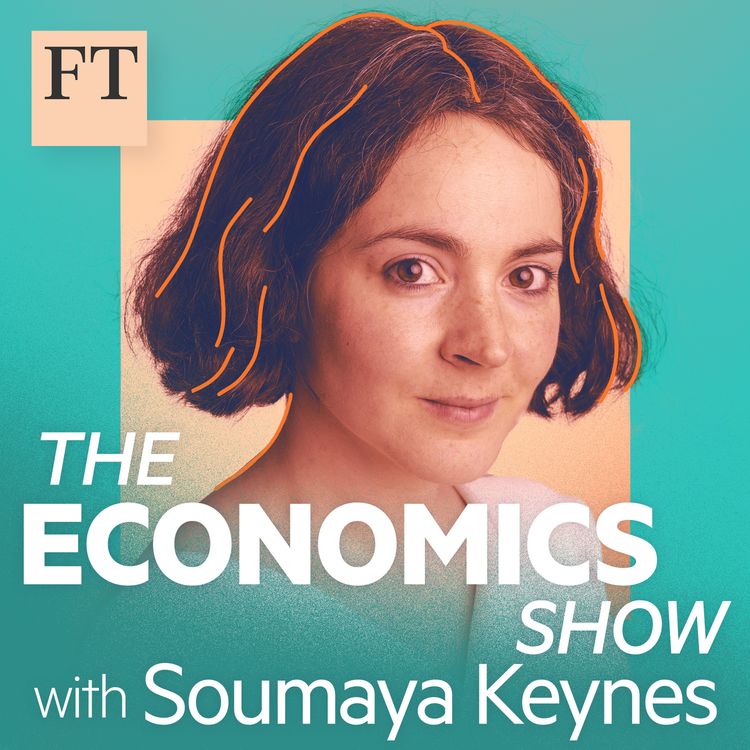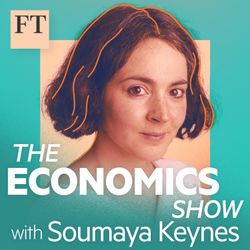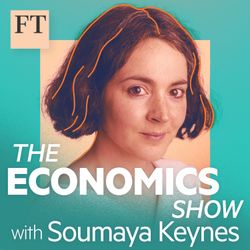Share

The Economics Show
The real Russian economy. With Sergei Guriev
The war in Ukraine is a humanitarian crisis. It is also an economic problem. Sanctions from the US and Europe are meant to make war too expensive for Russia to continue. President Vladimir Putin claims those sanctions have failed and his economy is strong. But what is propaganda and what is reality? Today on the show, host Martin Sandbu poses these questions to Sergei Guriev, dean of the London Business School, and an economic adviser to Russian opposition figures, as they try to figure out what is really going on in Russia’s economy.
Martin Sandbu is a columnist for the Financial Times, and writes the Free Lunch newsletter. You can find it here: https://www.ft.com/free-lunch.
Subscribe to Soumaya's show on Apple, Spotify, Pocket Casts or wherever you listen.
More episodes
View all episodes

Could common debt make the EU stronger? With Carlos Cuerpo
30:30|Some believe a deeper pool of common debt would allow the European Union to tackle some of its biggest problems, attracting more investment, reducing the cost of financing, and helping the EU achieve greater strategic autonomy. One such believer: Carlos Cuerpo, Spain’s economy, trade and business minister. In this episode, Soumaya asks him how a common EU safe asset would work, whether money (not politics) is the EU’s issue, and what the bloc could learn from Spain’s economic bounceback.Related linksEurope’s best bet for financial sovereignty is a true safe assetEurope is not thinking straight on competitivenessSubscribe to Soumaya's show on Apple, Spotify, Pocket Casts or wherever you listen.Read a transcript of this episode on FT.com
Trump’s tariffs are not dead yet, with Michael Froman
21:25|Shortly after the US Supreme Court ruled Donald Trump’s tariffs were illegal, he hit back. The president vowed to impose a 10% levy on US imports through different means. He raised those duties to 15% the following day. These tariffs – imposed under the Trade Act of 1974, rather than the International Emergency Economic Powers Act (IEEPA) – are only temporary. But Trump has a range of tariff tools at his disposal. How will he use them? Which of his trading partners will be worse off from these new policy changes? And will US companies that have already paid tariffs get their money back? To discuss all this and more, Soumaya is joined by former US trade representative, and president of the Council on Foreign Relations, Michael Froman.Subscribe to The Economics Show on Apple, Spotify, Pocket Casts or wherever you listen. Presented by Soumaya Keynes. Produced by Mischa Frankl-Duval. Original music from Breen Turner, and sound design by Sean McGarrityRead a transcript of this episode on FT.com
What did ‘Nudge’ get wrong? With Nick Chater
29:59|When Richard Thaler and Cass Sunstein released their book ‘Nudge’ in 2008, it caught the public imagination. ‘Nudge theory’ – the idea that people could be encouraged to make better choices through small, subtle interventions – was innovative, and exciting. A decade and a half later, a whole lot of nudging seems to have come to a whole lot of nothing. Why wasn’t ‘nudge theory’ more help in tackling climate change, or helping people enroll in pensions? And, even if it hasn’t saved the world, does behavioural science still have a role in policymaking? Former member of the UK’s Behavioural Insights Team and professor of behavioural science, Nick Chater, reflects on the legacy of nudges.Related LinksCan we ‘nudge’ our way to higher growth?The uses — and the limits — of ‘nudge’ economicsWhat nudge theory got wrongSubscribe to Soumaya's show on Apple, Spotify, Pocket Casts or wherever you listen.Read a transcript of this episode on FT.com
How China is fighting ‘involution’, with Yanmei Xie
30:21|China’s export powerhouse is feeding global demand for cheaper electronics, cars, clothing, and plenty more besides. But the supercharged competition driving that trend is causing problems within China itself, including deflation and thin or negative profit margins. China’s government has recognised the problem, but what is it actually doing in response – and how should the country’s trading partners react? Soumaya speaks to Yanmei Xie, senior associate fellow at the Mercator Institute for China Studies, to discuss.Subscribe to Soumaya's show on Apple, Spotify, Pocket Casts or wherever you listen.Presented by Soumaya Keynes. Produced by Josh Gabert-Doyon and Mischa Frankl-Duval. Manuela Saragosa is the executive producer. Original music and sound design by Breen Turner. The FT head of audio is Cheryl Brumley.For China, ‘involution’ is a blessing as well as a curseWhy China is reluctant to make a much-needed shiftFall in Chinese investment suggests Xi Jinping’s ‘anti-involution’ drive is bitingChina battles price wars in fight against deflationRead a transcript of this episode on FT.com
What an economist eats for lunch (in 2026), with Tyler Cowen
32:53|If you want to understand food – and eat better – economics is a good place to start. How do immigration patterns shape a country’s cuisine? How do labour laws make our working lunches worse? And why do strip malls serve such good grub? To find out, Soumaya Keynes talks to Tyler Cowen, economics professor at George Mason University and chair of the Mercatus Center think-tank. Cowen has written about food for more than two decades, including in his 2012 book An Economist Gets Lunch.Read Soumaya’s columns here: https://www.ft.com/soumaya-keynesSubscribe to The Economics Show on Apple, Spotify, Pocket Casts or wherever you listen. Presented by Soumaya Keynes. Produced by Mischa Frankl-Duval. Manuela Saragosa is the executive producer. Cheryl Brumley is the FT’s global head of audio. Original music and sound design by Breen Turner.Read a transcript of this episode on FT.com
How big a deal is the EU-India trade agreement? With Nicolas Köhler-Suzuki and Ajay Srivastava
27:44|The EU-India trade deal was partly a geopolitical statement, directed towards Trump. But what’s actually in it? What were the toughest bits to agree, who gave up concessions, and what will the deal mean for the economies of India and the EU? Soumaya Keynes is back to chat to Nicolas Köhler-Suzuki, adviser for trade and economic security, Jacques Delors Institute, and Ajay Srivastava, founder of the Global Trade Research Initiative in Delhi, and a former trade negotiator. Subscribe to Soumaya's show on Apple, Spotify, Pocket Casts or wherever you listen.Further reading: EU and India seal trade pact to slash €4bn of tariffs on bloc’s exportsIndian exporters seek new markets after Donald Trump’s trade blitzEU leaders push to implement Mercosur trade pactPresented by Soumaya Keynes. Produced by Josh Gabert-Doyon, Manuela Saragosa is the executive producer. Original music and sound design by Breen Turner. The FT’s global head of audio is Cheryl Brumley.Read a transcript of this episode on FT.com
The economy in 2026: What risks lie ahead? With Gita Gopinath
25:13|Are the headline growth figures really telling us the full story about the global economy? Gita Gopinath, a former deputy managing director at the IMF and a professor of economics at Harvard University, discusses this question with Martin Wolf, the FT’s chief economics commentator. They talk about how AI investments are offsetting the economic drag from tariffs, the risk of another financial crisis and whether the dollar can remain the world’s dominant currency. Subscribe to Soumaya's show on Apple, Spotify, Pocket Casts or wherever you listen.Further reading: Trump is erasing the global economic orderSo you tried to buy a country . . . IMF warns global economic resilience at risk if AI faltersPresented by Soumaya Keynes. Produced by Josh Gabert-Doyon, Alex Bell and Kirsty Loughlin. Manuela Saragosa is the executive producer. Original music and sound design by Breen Turner. Read a transcript of this episode on FT.com
How the Fed fights back, with Don Kohn
34:53|It wasn’t the Trump administration’s first attack on the Federal Reserve – but it was perhaps the most shocking. The Department of Justice’s criminal investigation into Jay Powell – nominally over his testimony about the refurbishment of Fed buildings – has ramped up pressure on the Fed chair, whom Donald Trump has frequently criticised over the central bank’s interest rate stance. Will Trump succeed in imposing his will on the Fed, and how might the world’s most important financial institution fight back? Is there any hope that the next Fed chair will stand up to Trump? FT US economics editor Claire Jones speaks to the Fed's former vice-chair Don Kohn.Further ReadingHigh-stakes Powell probe carries risks for US justice departmentCentral bank chiefs ‘stand in full solidarity’ with Jay PowellJustice department’s probe into Jay Powell galvanises Fed leaders to repel Donald Trump’s attacksClaire Jones is the FT’s US economics editor. You can find her articles here.Subscribe to The Economics Show on Apple, Spotify, Pocket Casts or wherever you listen. Presented by Claire Jones. Produced by Mischa Frankl-Duval. The executive producer was Manuela Saragosa. Original music from Breen Turner, and sound design by Breen Turner and Sam Giovinco.Read a transcript of this episode on FT.com
How bad is America’s affordability crisis? With Mechele Dickerson
31:48|Affordability is set to be a key issue in US politics ahead of the country’s midterm elections. And though American politicians often express their support for the country’s middle class, life has become progressively more difficult for that group, Mechele Dickerson argues. The University of Texas law professor explains how sluggish wage growth, housing policy and the growth of personal debt have made it harder to secure the markers of middle class life.Claire Jones is the FT’s US economics editor. You can find her articles here Subscribe to The Economics Show on Apple, Spotify, Pocket Casts or wherever you listen. Presented by Claire Jones. Produced by Mischa Frankl-Duval. Manuela Saragosa is the FT’s acting co-head of audio. Original music from Breen Turner, and sound design by Sam Giovinco.Read a transcript of this episode on FT.com